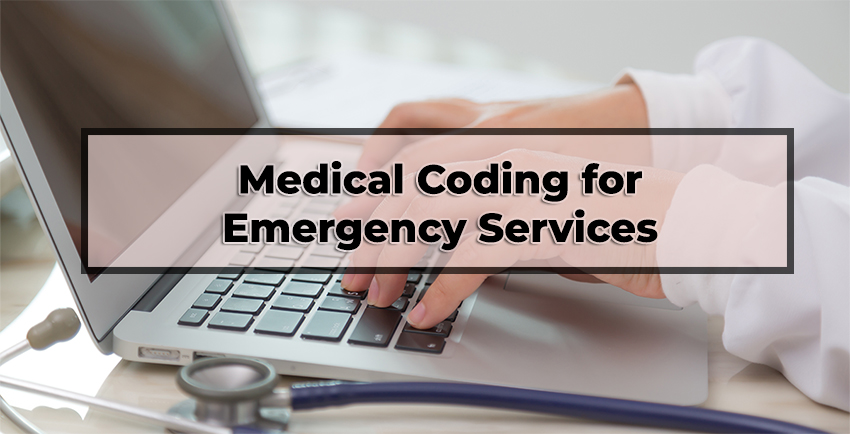Medical Coding for Emergency Services
Emergency services coding is a specialized area of medical coding that focuses on documenting and billing the services provided in emergency departments (EDs). The nature of emergency care requires swift and accurate coding, as patients often present with a wide range of urgent conditions that must be addressed immediately. The coding for emergency services involves capturing all diagnoses, treatments, and procedures that occur during the emergency visit, ensuring timely reimbursement and proper record-keeping.

Emergency departments provide a critical role in the healthcare system, addressing acute medical conditions, traumatic injuries, and life-threatening situations. The coding for emergency services must reflect the complexity and urgency of care provided, requiring coders to be knowledgeable in emergency medicine, coding guidelines, and the use of specific coding systems like CPT and ICD-10-CM.
Key Components of Emergency Services Coding
- Evaluation and Management (E/M) Services: The Evaluation and Management (E/M) codes are a major part of coding for emergency services, as they describe the nature and extent of the services provided to assess and treat patients in the emergency department. E/M codes for emergency visits, such as "99281" to "99285," are determined based on the complexity of the case, the level of medical decision-making, and the thoroughness of the history and physical examination conducted by the healthcare provider. Higher-level codes represent more complex and critical cases, while lower-level codes are used for less severe conditions.
- Diagnosis Coding (ICD-10-CM): Accurate diagnosis coding using ICD-10-CM is essential in emergency services to capture the reason for the patient's visit. Coders must identify all conditions, symptoms, and injuries that are evaluated and treated during the emergency visit. Since emergency departments often deal with diverse cases, including trauma, acute illnesses, and chronic disease exacerbations, accurate diagnosis coding is critical for documentation, treatment planning, and billing.
- Procedure Coding (CPT and HCPCS): Emergency services frequently involve various procedures, such as diagnostic tests, imaging studies, minor surgical interventions, and medication administration. Coders use CPT codes to document the specific procedures performed, from suturing wounds to providing IV fluids. HCPCS codes may also be used for additional services like the administration of medications or the use of certain equipment.
- Critical Care Services: Critical care services are a specific category within emergency services coding. They are used when a patient requires immediate and comprehensive care due to life-threatening conditions. Critical care codes (e.g., "99291" and "99292") reflect the high level of intensity and complexity involved in managing the patient's condition. Coders must be familiar with the criteria for critical care coding, as it involves documenting the time spent on active management of the patient’s life-threatening issues.
Reimbursement and Billing for Emergency Services
Reimbursement for emergency services relies on accurate coding of the services provided during the visit. Since emergency care is often unpredictable and urgent, proper coding helps ensure that healthcare providers are compensated for their work. Emergency services are typically reimbursed based on fee-for-service models, where each service provided (e.g., E/M, procedures, imaging) is billed and paid for separately.
Modifiers play a crucial role in emergency services coding, as they provide additional details about the nature of the service, such as multiple procedures, bilateral procedures, or services performed by multiple providers. The correct use of modifiers helps clarify any unique circumstances and ensures accurate billing.
The Role of Documentation in Emergency Services Coding
Given the fast-paced and unpredictable nature of emergency care, detailed and accurate documentation is essential. Coders rely on physician notes, nursing records, diagnostic test results, and treatment details to accurately assign codes. Since emergency services involve rapid assessment and treatment, documentation must clearly capture the patient's presenting symptoms, the provider's evaluation, and all interventions performed.
Documentation must also support the level of E/M coding assigned, with thorough details on the patient's history, examination, and the decision-making process involved in their care. Coders must ensure that all relevant information is included to substantiate the codes used and facilitate proper billing and reimbursement.
Challenges of Coding for Emergency Services
Coding for emergency services comes with its own challenges, including:
- Wide Variety of Conditions and Procedures: Emergency departments encounter a wide range of medical issues, from acute injuries to cardiac events. Coders must be well-versed in multiple coding systems and understand how to accurately code diverse conditions and procedures.
- Rapid Turnaround and High Volume: Emergency departments are fast-paced and handle a high volume of patients. Coders must be able to quickly and accurately code each case based on the documentation provided while ensuring compliance with coding guidelines.
- Complexity of Critical Care Coding: Coding for critical care services requires an understanding of specific guidelines and time-based coding, as critical care involves active management of life-threatening conditions. Coders must accurately document and code the time spent and the services provided to ensure proper reimbursement.
Medical coding for emergency services is a crucial part of healthcare coding that demands accuracy, speed, and a thorough understanding of coding systems like CPT and ICD-10-CM. By accurately coding E/M services, diagnoses, procedures, and critical care interventions, coders help ensure that emergency departments receive appropriate reimbursement and maintain comprehensive medical records. Coders play a vital role in the financial health of emergency care facilities, supporting the delivery of timely and effective care to patients in urgent need.

